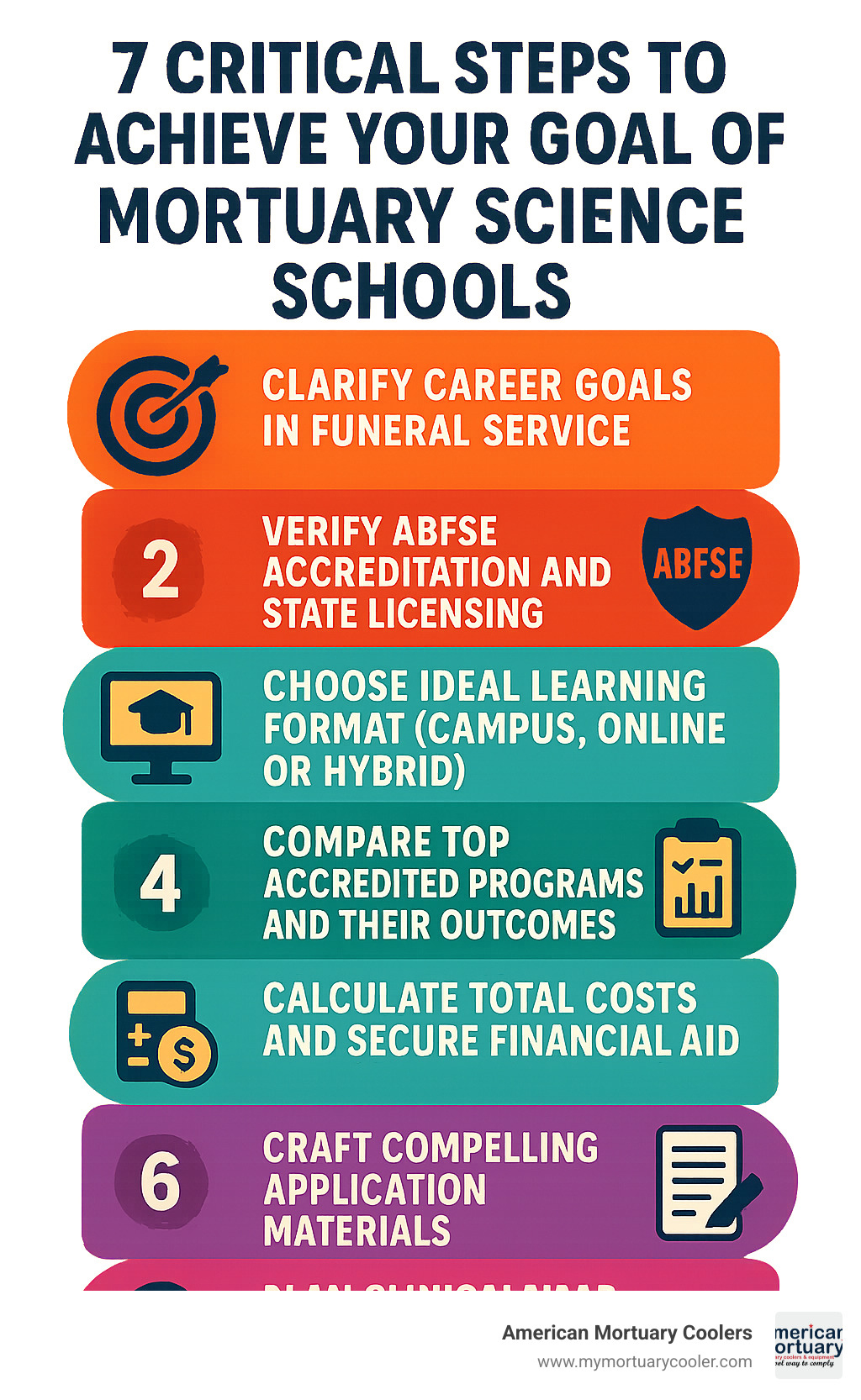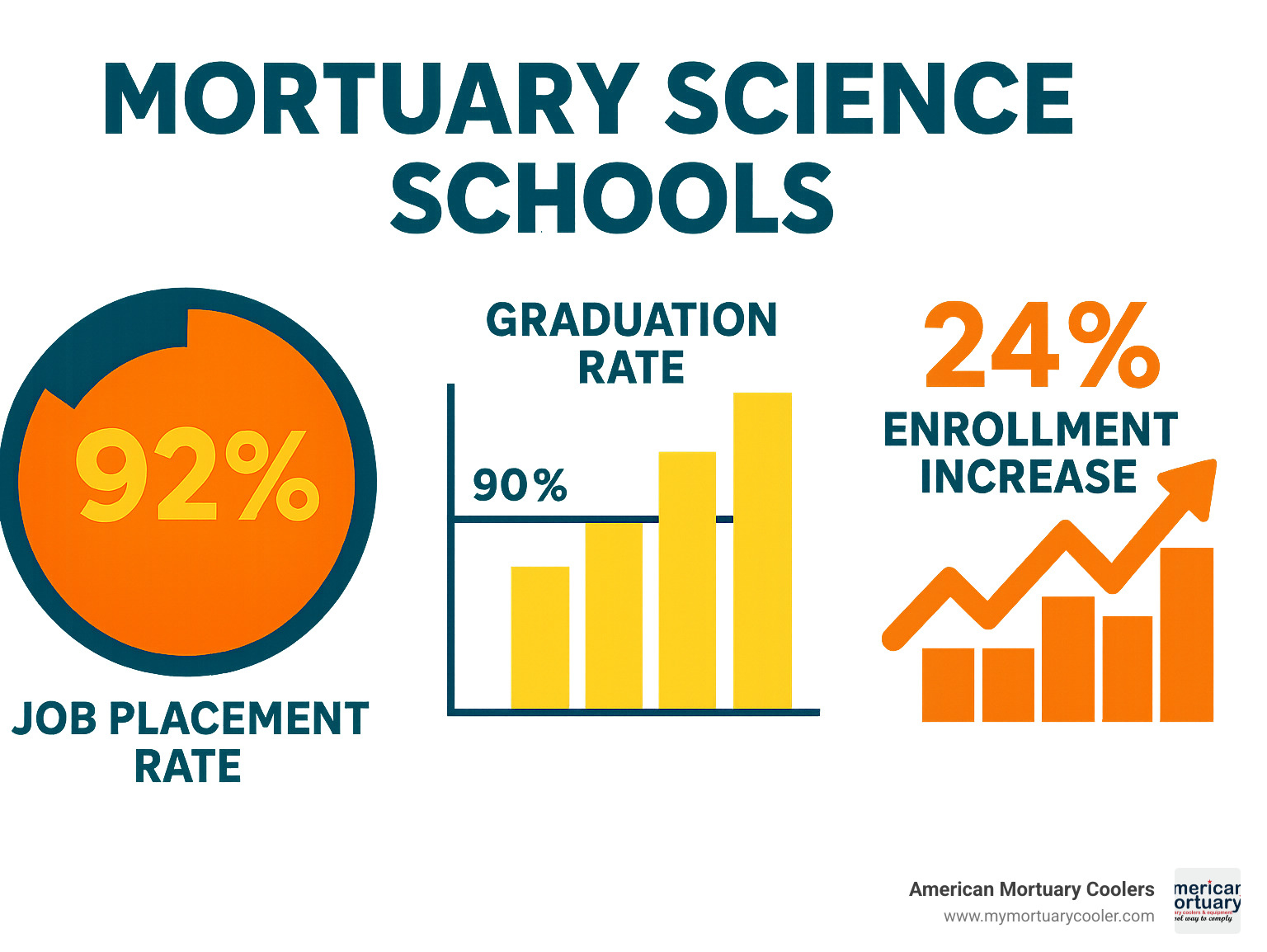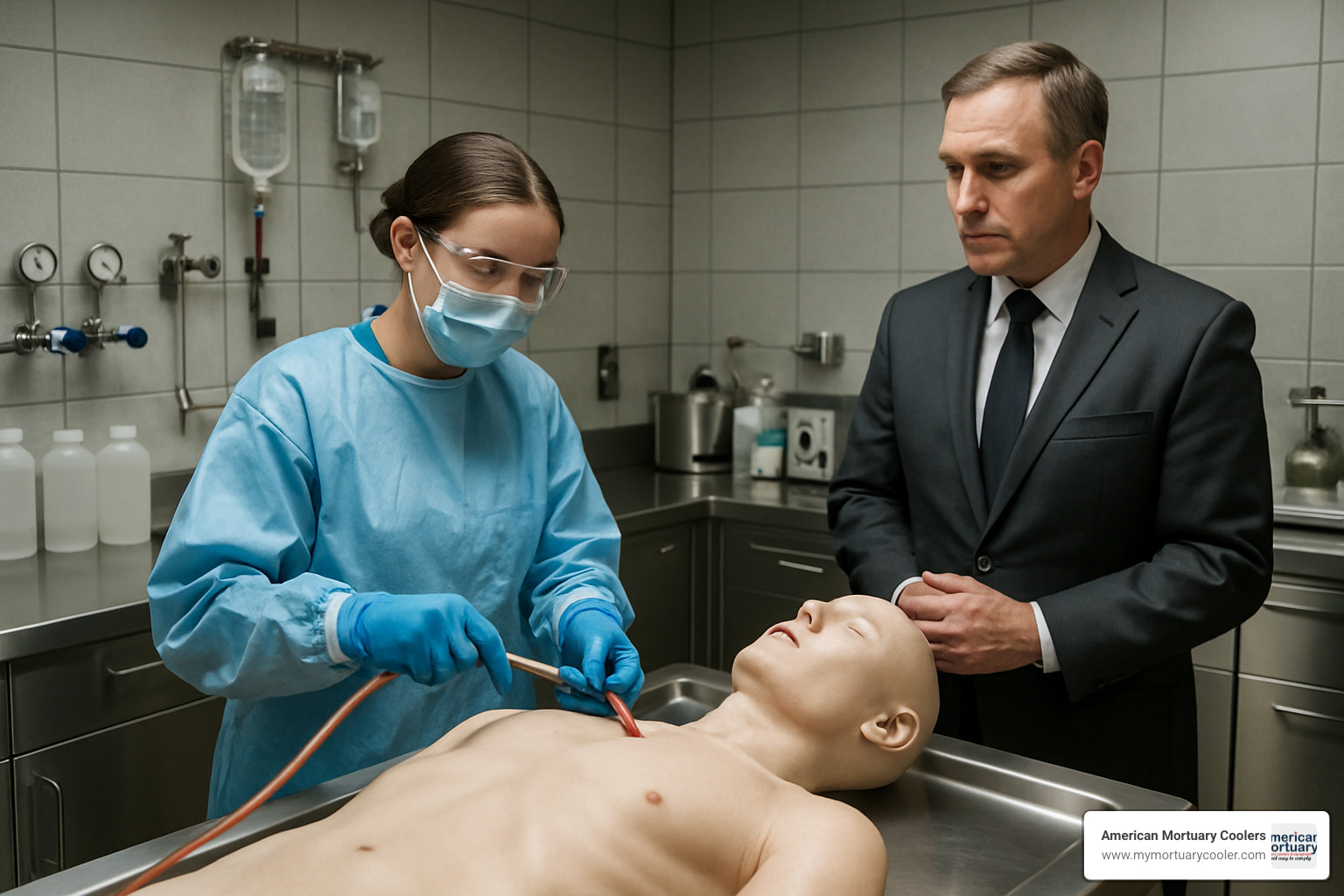
7 Critical Steps to Achieve Your Goal of Finding Mortuary Science Schools
Why Choosing the Right Mortuary Science Schools Can Transform Your Career
Mortuary science schools are specialized educational institutions that prepare students for careers in funeral service, embalming, and death care. These programs typically offer associate degrees, certificates, or bachelor's degrees with coursework in anatomy, chemistry, embalming techniques, funeral law, and grief counseling.
Key facts about mortuary science schools:
- 43 accredited programs currently offer distance education options
- 24% enrollment increase in 2021 shows growing industry demand
- ABFSE accreditation required for professional licensure in most states
- 18-month to 4-year program lengths depending on degree type
- 92% job placement rate reported by top-performing schools
- $4,000-$17,000 average annual tuition range varies by state and school type
Popular career paths include:
- Funeral Director
- Embalmer
- Crematory Operator
- Bereavement Counselor
- Funeral Home Manager
The funeral service industry is experiencing significant growth, with schools like Wayne State University and Worsham College reporting excellent graduate outcomes. However, choosing the wrong program can delay licensure and limit career opportunities.
I'm Mortuary Cooler, a national-level mortuary cooler supplier with extensive experience working alongside funeral professionals and mortuary science schools across the country. Through my work providing essential equipment to educational institutions and funeral homes, I've gained deep insights into what makes mortuary science schools successful.

Mortuary science schools vocab explained:
1. Clarify Your Career Goals in Funeral Service
Before researching mortuary science schools, consider what you want to do in funeral service. This industry offers several career paths, each requiring different training and skills.
Funeral directors coordinate everything from memorial services to final burial or cremation. They work directly with grieving families, requiring compassion, business skills, and the ability to stay calm under pressure. Most states require funeral directors to graduate from accredited mortuary science schools with an associate degree, plus complete apprenticeship hours.
Embalmers focus on preserving and preparing bodies, requiring deep knowledge of anatomy, chemistry, and artistic restoration techniques. Schools like Pittsburgh Institute of Mortuary Science provide hands-on experience with over 500 embalmings during their program.
Crematory operators are increasingly in demand as more families choose cremation. These professionals manage cremation equipment, ensure proper procedures, and maintain detailed records.
Bereavement counselors combine mortuary science knowledge with counseling skills to support families through their grief journey.
For detailed information about specific career paths, check out your path to becoming a funeral director.
Where Mortuary Science Fits
Mortuary science schools typically offer three main options:
Certificate programs are the shortest route, usually taking 12-15 months. These focus on specific skills like embalming techniques or funeral directing basics, perfect for career changers or those wanting to specialize.
Associate degrees are considered the gold standard in funeral service. These programs require about 60 semester hours with comprehensive training in all aspects of mortuary science. Schools like Mid-America College of Funeral Service offer accelerated 18-month programs.
Bachelor's degrees provide the most comprehensive education, including advanced topics like business management and forensic science. Wayne State College offers both Bachelor of Arts and Bachelor of Science options, requiring 83-84 total credit hours including a full clinical year.
The degree you choose depends on your career goals, timeline, and state licensure requirements.
2. Verify Accreditation & Licensing Requirements
When choosing mortuary science schools, accreditation is absolutely essential. The American Board of Funeral Service Education (ABFSE) maintains strict standards that separate legitimate programs from diploma mills. Currently, 43 accredited programs offer distance education options, though all require hands-on lab work.
State licensing requirements vary significantly. Most states expect you to graduate from an ABFSE-accredited program, pass the National Board Examination (NBE), complete supervised apprenticeship hours, and maintain high ethics standards.
Check the Scientific research on licensure for detailed state-by-state requirements.
Why ABFSE-Approved Mortuary Science Schools Matter
Quality assurance means these schools undergo rigorous evaluations of curriculum, faculty qualifications, and graduate outcomes including NBE pass rates and job placement statistics.
Transfer credits from ABFSE-accredited programs transfer smoothly to other institutions, potentially saving thousands of dollars and months of repeated coursework.
Licensure eligibility depends almost entirely on ABFSE accreditation. State licensing boards typically won't consider applications from non-accredited programs.
Navigating State-Specific Rules
Apprenticeship hours vary dramatically by state, from zero to several thousand hours of supervised experience. Some states allow concurrent apprenticeship during school, while others require degree completion first.
Continuing education requirements affect long-term career planning, with many states mandating ongoing professional development.
Reciprocity agreements between states can simplify license transfers if you relocate or want to practice in multiple states.
3. Pick Your Ideal Learning Format
Today's mortuary science schools offer three main learning formats to accommodate different student needs.
On-campus programs provide traditional classroom instruction with immediate access to embalming labs, restoration equipment, and face-to-face professor interaction. Schools like Cincinnati College of Mortuary Science emphasize hands-on learning in embalming labs, restoration workshops, and dissection rooms.
Online programs work well for working adults or those living far from campus. However, even comprehensive online programs require laboratory work and hands-on training, meaning campus visits for intensive sessions.
Hybrid programs combine online theoretical coursework with scheduled campus visits for lab work. Wayne State University offers traditional, online, and hybrid options to fit different lifestyles.
Pros & Cons of Different Formats
On-campus learning provides full immersion in mortuary science with easy lab access and strong peer relationships. Downsides include less scheduling flexibility and higher living costs.
Online learning offers flexibility for working students and significant cost savings on housing and commuting. However, it requires strong self-discipline and you'll still need to travel for mandatory lab sessions.
Building Hands-On Skills
Embalming labs teach arterial injection techniques, cavity treatment procedures, and chemical preparation under faculty supervision. Many schools partner with local funeral homes for diverse real-world exposure.
Restorative art combines technical precision with creative sensitivity, covering cosmetic application, facial reconstruction, and hair styling while maintaining dignity.
Funeral practicum provides actual funeral service participation, including arrangement conferences, service coordination, and family interaction.
4. Compare Top Accredited Mortuary Science Schools
When choosing mortuary science schools, certain programs consistently produce well-prepared graduates.
Wayne State University has educated funeral service professionals since 1939, offering traditional, online, and hybrid options for maximum flexibility.
Worsham College of Mortuary Science achieves a 92% job placement rate with 25 instructors for 180 students, ensuring personal attention.
Cincinnati College of Mortuary Science emphasizes hands-on campus labs, achieving nearly 90% graduation rates with over 85% of graduates employed in funeral service.
Arapahoe Community College achieved 91% graduation rates in 2021, with over 80% of graduates working in funeral services. They use innovative case-management tools simulating actual funeral home operations.
Dallas Institute of Funeral Service saw 109% enrollment growth from 2019 to 2021, while Mid-America College of Funeral Service experienced 94% enrollment growth while maintaining 92% employment rates.
Pittsburgh Institute of Mortuary Science (PIMS) completes over 500 embalmings on campus annually, providing extensive hands-on experience while freezing tuition for five consecutive years.
High-Outcome School Statistics

Leading institutions consistently achieve 92% job placement rates, while the 24% enrollment surge in 2021 shows growing interest in funeral service careers. Top programs maintain graduation rates above 90% and NBE pass rates exceeding national averages.
Online-Friendly Programs
Currently, 43 accredited programs offer online components, though hands-on laboratory work remains mandatory. Verify your chosen school has proper authorization in your state of residence and contact your state licensing agency about employment requirements.
For comprehensive information, visit More info about Mortuary Science Education 101.
5. Calculate Cost & Secure Financial Aid
Understanding the total cost of mortuary science schools includes tuition, fees, equipment, travel, and living expenses.
Tuition Ranges:
- Community colleges: $4,000-$8,000 annually
- Private specialized schools: $15,000-$20,000 annually
- Four-year universities: $10,000-$25,000 annually
Federal financial aid is available for students attending accredited mortuary science schools. Complete the FAFSA to determine eligibility for grants, loans, and work-study programs.
Hidden Costs
Lab Fees: Specialized equipment and materials can add $1,000-$3,000 annually. Clinical Travel: Transportation, lodging, and meals for lab sessions. Board Exam Preparation: NBE exam fees and study materials typically cost $500-$1,500. Professional Equipment: Required instruments, uniforms, and safety equipment. Licensing Fees: State applications, background checks, and renewal fees.
Funding Opportunities
NFDA Scholarships: The National Funeral Directors Association provides various scholarship opportunities. School-Based Awards: Many institutions offer merit-based scholarships. Employer Sponsorship: Some funeral homes sponsor employees' education in exchange for employment commitments. State-Specific Programs: Some states offer grants for students entering high-demand service professions.
6. Craft a Stand-Out Application Package
Competitive mortuary science schools receive more applications than available spots, so you need to demonstrate genuine passion and solid preparation.
Most programs look for a GPA of 2.5 or higher, though competitive programs often expect 3.0 or above. Performance in prerequisite science courses carries extra weight - biology, chemistry, and anatomy form your educational foundation.
Recommendation letters should come from people who know your work ethic and character. Academic instructors, employers, or volunteer supervisors make excellent choices. Letters from funeral service professionals carry special weight.
Your personal statement should share specific experiences that drew you to funeral service. Skip generic "I want to help people" essays. Instead, describe meaningful encounters with end-of-life care or how a funeral director's compassion during your family's loss inspired your career choice.
Boosting Your Competitive Edge
Volunteer hospice work provides direct exposure to end-of-life care while demonstrating comfort with death and dying. This experience shows admissions committees you understand the profession's emotional demands.
Shadowing funeral directors offers insight into daily responsibilities and challenges. Most funeral directors welcome serious students to observe their work.
Healthcare experience in hospitals or nursing homes shows you're comfortable in medical environments and can handle human suffering professionally.
For additional strategies, check out 7 Smart Strategies for Landing a Mortuary Job.
7. Plan Your Clinical Year & Job Placement
Your clinical year transforms theoretical knowledge into real-world skills while opening career doors.
Funeral home internships place you in working establishments under licensed professionals. You'll participate in every operation aspect, from difficult family phone calls to memorial service coordination.
Co-op programs alternate academic study with paid work experience, benefiting everyone involved while often leading to job offers before graduation.
Mentorship opportunities pair you with seasoned professionals who become career guides. These relationships prove invaluable long after graduation.

Turning Clinical Experience into Employment
Your clinical placement is an extended job interview. Professional performance means showing up early, staying late when needed, and approaching every task enthusiastically. The funeral service industry values reliability above almost everything else.
Building industry connections happens naturally during clinical work. Every professional you meet could help your career. Join professional organizations like the National Funeral Directors Association for student memberships connecting you with established professionals.
Resume development means documenting specific achievements: "assisted with 47 embalmings, coordinated 23 funeral services, provided grief support to 15+ families" rather than just "completed internship."
Professional Conduct Standards
Confidentiality in funeral service means every detail about deceased individuals and families is sacred trust. Casual conversation about cases is never appropriate.
Compassion develops through practice and reflection. Your genuine empathy provides comfort when nothing else can.
OSHA safety protocols protect everyone when working with embalming chemicals and human remains. Safety violations can result in program dismissal and licensing problems.
Legal compliance covers transportation, documentation, and extensive regulations. Understanding requirements isn't optional - violations can end careers.
Integrity underlies everything in funeral service. Families trust you during emotional crisis, demanding absolute honesty in all interactions.
Frequently Asked Questions about Mortuary Science Schools
How long does it take to finish most mortuary science programs?
Certificate programs take 12-15 months of focused study, ideal for career changers wanting quick entry.
Associate degrees require 18-24 months for full-time students. Mid-America College offers an accelerated 18-month program, while Wayne State College requires 83-84 credit hours including a 30-credit clinical year.
Bachelor's degrees take 3-4 years total, depending on prerequisite completion and clinical requirements.
Do online mortuary science schools still require on-site labs?
Yes. While 43 accredited programs offer distance education, all require hands-on laboratory work. Students must complete practical requirements on campus or at approved facilities through intensive sessions or residencies.
What's the career outlook for funeral service graduates?
The outlook is encouraging. Top mortuary science schools report job placement rates of 90-92%. The 24% enrollment increase in 2021 coincides with real industry demand from aging populations and evolving service preferences. Career opportunities now extend beyond traditional roles to include crematory operations, grief counseling, and funeral home management.
Conclusion
Finding the right mortuary science schools is crucial for your funeral service career. The seven steps we've covered provide a solid roadmap for preparing to serve families during their most vulnerable moments.
At American Mortuary Coolers, we've worked with mortuary science schools and funeral professionals across the country for years. From Tennessee, we've delivered custom mortuary coolers and equipment to educational institutions in all 48 contiguous states, giving us insight into what makes programs successful.
The best students combine good grades with genuine compassion, strong work ethic, and realistic understanding of funeral service. Technical skills matter, but the heart behind the work matters more.
The industry is experiencing real growth. Those 92% job placement rates represent real people starting meaningful careers, while the 24% enrollment increase shows more people finding this profession offers stability and purpose.
As you research programs, visit campuses, talk to current students and graduates, and shadow a funeral director. The more you understand about education and career realities, the better choice you'll make.
Choosing accredited mortuary science schools with strong track records sets you up for licensing success and career opportunities. The relationships you build during school often become your professional network for years.
By following these seven steps and choosing thoughtfully, you're showing the dedication that makes great funeral service professionals. This career path offers something special - the chance to help others during life's most difficult moments.
For more detailed information about degree options and career planning, check out Everything You Need to Know About a Mortuary Science Degree.




